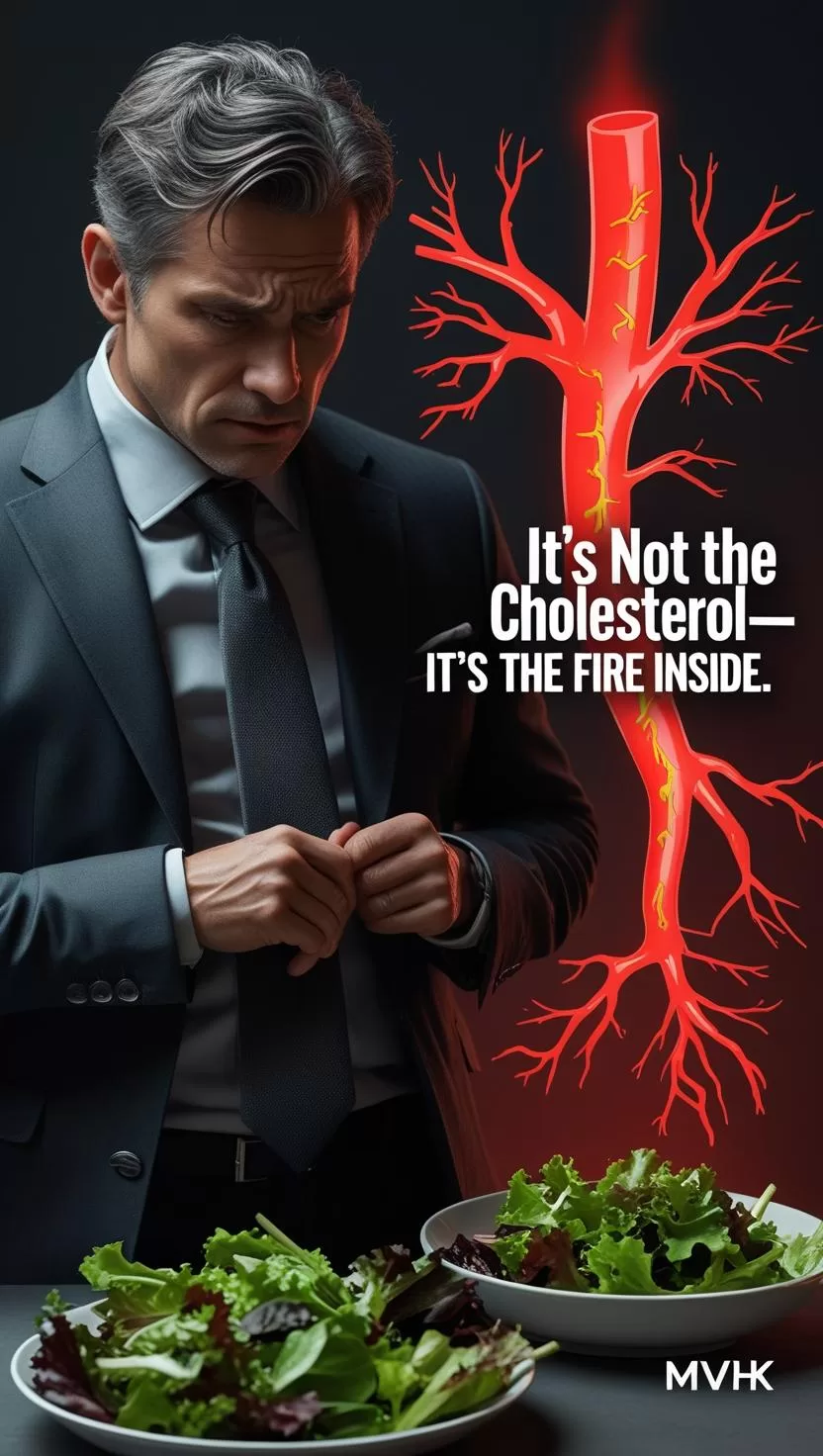The Hidden Culprit Behind High Cholesterol and Heart Disease: Inflammation
Inflammation—not cholesterol—is the primary driver of heart disease.
For decades, cholesterol was painted as the enemy of heart health. But modern research points to a deeper, more sinister root cause: chronic inflammation. This subtle fire within your body oxidizes LDL cholesterol, hardens arteries, and leads to dangerous plaque buildup. And what fuels this inflammation? Not just diet, but also poor sleep, stress, sugar, and sedentary lifestyles—especially in busy professionals.
Let’s break down how to put out the internal fire before it causes a heart attack.
1️⃣ Understanding the True Villain: Inflammation
🔥 Inflammation: The Spark that Ignites Heart Disease
Inflammation is your body’s immune response. But when it becomes chronic, it silently damages blood vessels, oxidizes LDL cholesterol, and triggers a cascade of plaque buildup. Unlike cholesterol, inflammation doesn’t just float in your blood—it burns through your arterial lining.
🧪 The Oxidized LDL Problem
LDL itself isn’t evil. In fact, your body uses it for cell repair and hormone production. But when it’s oxidized by inflammation (from seed oils, high stress, poor sleep), it becomes sticky and harmful—forming plaques that narrow arteries and raise heart attack risk.
📚 A 2017 Journal of Clinical Lipidology study found that oxidized LDL, not LDL itself, was a stronger predictor of cardiovascular disease. [source]
2️⃣ The 5 Lifestyle Factors Driving Inflammation
1. 🌻 Seed Oils: The Silent Oxidizers
Highly refined seed oils (canola, soybean, sunflower) are high in omega-6 fatty acids, which disrupt your omega-3/6 ratio and create a pro-inflammatory environment.
- Replace with: Extra virgin olive oil, avocado oil, grass-fed butter.
2. 😴 Poor Sleep = Systemic Breakdown
Sleep deprivation raises cortisol, blood pressure, and inflammatory cytokines.
- Optimize: 7–9 hours per night. Stick to a sleep-wake cycle.
3. 😰 Chronic Stress: The Cortisol Cascade
Work stress, emotional suppression, and mental overload flood your system with cortisol—spiking inflammation and insulin resistance.
- Solution: Mindful breathing, walking breaks, magnesium supplementation.
4. 🚶♂️ Lack of Movement
Sedentary lifestyles slow circulation and reduce nitric oxide—a compound essential for arterial health.
- Tip: Aim for 10,000 steps/day or 30 mins of moderate movement.
5. 🍩 Sugar & Refined Carbs
Excess glucose leads to glycation—a process that damages arterial walls and accelerates inflammation.
- Upgrade: Choose low-glycemic fruits, leafy greens, whole foods.
3️⃣ How to Reverse Inflammation and Protect Your Heart
🥗 Anti-Inflammatory Nutrition Plan
- Omega-3s from wild salmon, chia seeds, flax
- Turmeric (curcumin), ginger, green tea
- Berries, cruciferous veggies, fermented foods
💪 Exercise and Stress Management
- HIIT 2x/week and mobility daily
- Yoga or breathwork for parasympathetic activation
🩺 Test Your Inflammation Markers
Ask your doctor for:
- hs-CRP (High-sensitivity C-Reactive Protein)
- Oxidized LDL
- Homocysteine
- Lp(a)
These offer a more accurate picture of heart risk than total cholesterol alone.
🚀 Conclusion: How to Get Started Today
You don’t need another statin—you need to lower inflammation. Start by cutting seed oils, upgrading sleep, walking more, and de-stressing. The result? Lower heart disease risk, more energy, and longer life.
🛠️ Take the first step: Swap your cooking oil. Tonight. Your arteries will thank you.
❓FAQ
What is oxidized LDL and why is it dangerous?
Oxidized LDL is LDL cholesterol that has been damaged by free radicals due to inflammation. It’s more likely to cause plaque buildup in arteries.
Do I still need to monitor my cholesterol?
Yes—but it’s more important to assess inflammatory markers like hs-CRP and oxidized LDL than just total cholesterol.
Can inflammation be reversed?
Absolutely. Through dietary changes, stress management, sleep improvement, and daily movement, chronic inflammation can be significantly reduced or eliminated.






